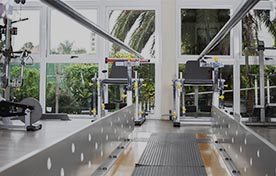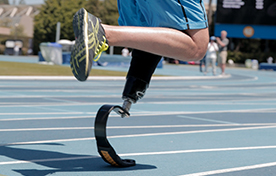What Is the Amputee Coalition and What Can We Do for You?
Empowerment. Leadership. Partnership.
Today, more than 2 million Americans have experienced limb loss or were born with limb differences. Another 28 million people in our country are at risk for amputation.
The Amputee Coalition is the nation’s leading organization on limb loss, dedicated to enhancing the quality of life for amputees and their families, improving patient care and preventing limb loss.
Since 1986, the Amputee Coalition has served thousands upon thousands of people who have lost a limb, along with their families and caregivers. Our programs are designed to inform, educate and offer support – empowering each individual on his or her journey to recovery, readjustment and regaining life purpose and direction.
The Amputee Coalition’s circle includes an extensive network of healthcare professionals. We forge alliances with physicians, podiatrists, nurses, physical therapists, prosthetists, researchers and other limb loss experts and lead efforts to improve care and increase access to services. We mobilize advocacy at state and national levels for fair health coverage and other issues that affect people with limb loss. Another critical priority is reduction of the rising incidence of limb loss and the resulting costs to society due to growing rates of diabetes and heart disease. The Coalition is leading a national strategy to broaden awareness of these risks and to promote limb loss prevention.
In so many ways, the Amputee Coalition strives to improve life for those with limb loss through empowerment, leadership and partnership. We invite you to learn more about the Amputee Coalition and to join us in our mission – as a volunteer, donor, healthcare ally or friend.
Our Mission
To reach out to and empower people affected
by limb loss to achieve their full potential
through education, support and advocacy, and to
promote limb loss prevention.
Empowering those with limb loss
Losing a limb can be emotionally and physically devastating. New amputees often feel overwhelmed and isolated from those around them, wondering what the future holds. Families and caregivers may be unsure how to help or where to turn. Amputee Coalition programs offer support, information and education that empower people with limb loss to move forward, regain hope and live rich, productive lives.
Amputee Resilience Program
The support of those who have experienced the journey of limb loss can play a vital role in helping people recover and resume participation in life. The National Peer Support Program offers these components:
- The Certified Peer Visitor Program matches trained volunteer peers with new amputees, based on age, gender, level of amputation, location and other factors. Peer visitors have all experienced limb loss and offer one-to-one support, information and resources during recovery and readjustment. Visits are in person, by phone or e-mail.
- The National Peer Support Group Network links those with limb loss to ongoing member support groups. In small groups of caring individuals, new amputees and their family members connect with others who have faced similar challenges, learn healthy coping strategies and practice skills in a supportive environment.
- The Coalition’s caregiver support programs are aimed at reducing isolation and enhancing the quality of the caregiving experience for those who care for people with limb loss. The Certified Caregiver Peer Visitor Program matches individuals who have provided care for an amputee with caregivers in need of support, both through the U.S. Department of Veterans Affairs Amputation System of Care for military personnel and veterans and through the Coalition’s program for civilians. The Parent Support Network addresses the unique needs of parents of children with limb loss/difference. Parent peer visitors offer support to parents throughout a child’s development.
- The Promoting Amputee Life Skills Course teaches participants helpful self-management skills that promote improved quality of life following limb loss. The course addresses topics such as problem-solving, communication, pain management, networking and community resources. Small group experiences with others who have lost limbs are part of the eight-session curriculum.
“From the moment I met my peer visitor,
I knew I could get to a new normal. He gave me hope
and confidence that I could get
my life back.”
— Luis de Leon
National Limb Loss Resource Center
Where can you turn when you have questions about limb loss? The National Limb Loss Resource Center is the nation’s leading source of information about limb loss and limb differences. All patient information is reviewed by the Coalition’s medical/scientific advisory committee of experts in the field of limb loss.
The Center provides comprehensive information and resources free of charge to people with limb loss and their families, friends and healthcare professionals. In addition, it serves as the key information source on limb loss for national partners such as the Centers for Disease Control and Prevention, the U.S. Department of Defense and the Veterans Affairs Amputation System of Care.
The Center’s wide range of topics address issues of concern to anyone dealing with limb loss, such as learning to live with your level of limb loss, finding appropriate providers, vendors and resources, locating peer and community support, and much more.
The Center can be accessed on the Amputee Coalition Web site, offering an online library catalog, informational videos, podcasts and fact sheets. Requests may also be made by email or by phone toll-free. Trained information specialists are available five days a week to provide callers with personalized assistance.
Limb Loss Education and Outreach
The Amputee Coalition is the leader for educational materials and programming targeted to those affected by limb loss and to the related healthcare community. These include inMotion, the Amputee Coalition’s award-winning bimonthly magazine; First Step, a comprehensive guide for new amputees; and other publications, fact sheets and updates on important topics. The Coalition also provides technical help, resources and training to local amputee organizations, healthcare professionals and the general public.
The Amputee Coalition hosts a national conference every two years. As the nation’s premier event for the limb loss community, the conference brings together hundreds of amputees, their families, and healthcare professionals for learning, interaction and networking. Similar opportunities are available throughout the year at regional Limb Loss Education Days and via webinars and other social media venues.Amputee Coalition Paddy Rossbach Youth Camp Children who have lost limbs or who were born with limb differences often struggle with self acceptance.
The Amputee Coalition Paddy Rossbach Youth Camp offers a traditional camp experience aimed at building self-esteem and self-confidence of youths with limb loss or limb differences. Each year, approximately 100 children ages 10 to 17 from around the country engage in fun and challenging activities and build new friendships in a supportive, caring environment. Thanks to camp sponsors, the program, which is named in honor of the Amputee Coalition’s former president, is free to participating families.
“My experience at camp was absolutely instrumental
to my self-confidence as an amputee.”
— Lacy Henderson
Leading efforts and partnering with others to prevent limb loss and improve care
On average, 507 people lose a limb every day in the United States. This number is expected to almost double by 2050 due to increasing rates of diabetes, heart disease and other risk factors. Not only does this represent a significant impact on individual lives but it places a major cost burden on the healthcare system. Yet many in the general public are unaware of the link between these conditions and the risk of
limb loss.
At the same time, care following limb loss can sometimes be fragmented and frustrating. Patients often confront obstacles, such as inadequate insurance coverage, that hinder their recovery and return to productive life.
As a leading voice and advocate in the disability community, the Amputee Coalition pursues strong collaborations and partnerships to achieve greater awareness and positive action in both prevention and patient care.
Limb Loss Task Force
Through the Limb Loss Task Force, the Amputee Coalition brings together leaders in the field to develop a national agenda and coordinated strategies around limb loss prevention and improved amputation care. The first such national effort of its kind, the Task Force is made up of leading experts including physicians, podiatrists, nurses, physical therapists, prosthetists, researchers and policy makers. Established by the Coalition in 2010, the Task Force convenes to monitor progress, develop new strategies and address emerging issues. The work of the Task Force holds great promise for reducing the rising incidence of limb loss and for improving care for those with limb loss or limb differences.
“The current incidence rates of limb loss
are alarming. We need people to understand that limb
loss can happen to them.”
— Dr. Terry Sheehan, Amputee Coalition Medical Director
and member of the Board of Directors
Limb Loss Awareness Month
Each April is Limb Loss Awareness Month, a major initiative launched by the Amputee Coalition to raise public awareness about the risk factors contributing to limb loss and strategies for prevention. The Coalition leads a wide range of awareness activities throughout the month at the national, state and local levels.
Healthcare Provider Membership
The support and involvement of healthcare providers is essential to improved prevention and patient treatment, care and education. The Coalition is creating new partnerships with the healthcare community through a special membership to providers – physicians and other direct-care providers, facilities, hospitals or rehabilitation centers. While offering benefits to the healthcare provider member, these relationships help the Coalition reach more patients in need of support, education and information.
Advocacy and Government Relations
The Amputee Coalition vigorously advocates for the rights of people with limb loss at state and national levels. The Coalition promotes the full implementation of the Americans with Disabilities Act and other legislation that guarantees full participation in society for all people, regardless of disability. For example, the Coalition has been instrumental in passage of legislation in 20 states that supports fair access to prosthetic and orthotic devices. A national grassroots strategy on this critical issue is continuing under the Coalition’s leadership. We are also working to ensure reasonable travel for amputees by providing constructive input and information to the Transportation Security Administration.
The Amputee Coalition’s advocacy efforts focus in these general areas:
- Supporting the health and well-being of people living with limb loss
- Providing fair access to prosthetic and orthotic devices
- Reducing limb loss
- Ensuring that appropriate prosthetic and orthotic devices and care for those with limb loss are covered under national health policies.
“Every morning I wake up and put on my prosthetic limb
and I thank God I have insurance coverage. I am thankful
that the Amputee Coalition continues to work
for insurance fairness.”
— Tami Stanley
Amputee Coalition
900 East Hill Avenue, Suite 290 | Knoxville, TN 37915
888/267-5669 www.amputee-coalition.org
With Offices in Washington, D.C. and Minneapolis, MN
Learn more about the Amputee Coalition, receive our monthly e-news and stay connected to the limb loss community by registering on our Web site at amputee-coalition.org.
This publication is supported by a cooperative agreement from the National Center on Birth Defects and Developmental Disabilities, Centers for Disease Control and Prevention (CDC). No funding from the Centers for Disease Control and Prevention (CDC) is used to support Amputee Coalition government affairs advocacy efforts
Disclaimer: The following information is provided and owned by the Amputation Coalition of America and was previously published on the website http://www.amputee-coalition.org or the Coalitions Newsletter, inMotion.








